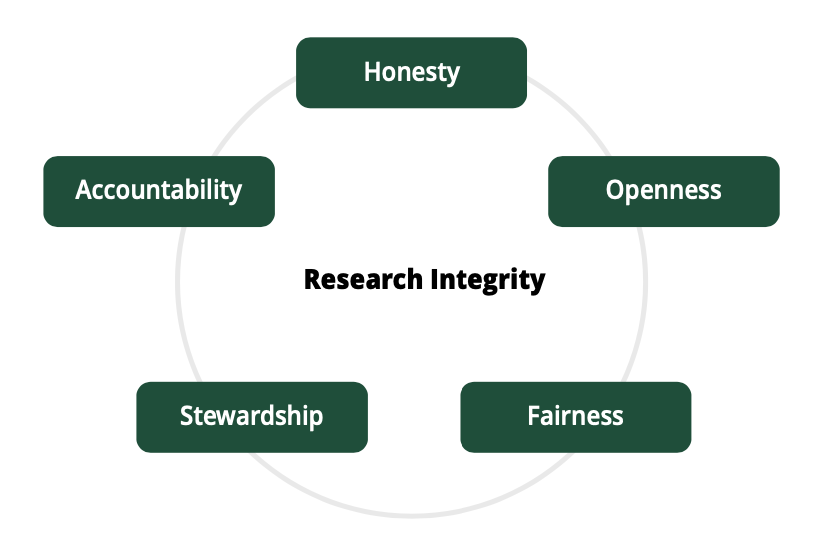Greg M. Swain, Professor of Chemistry at Michigan State University, emphasizes the importance of responsible and ethical conduct of research (RECR) in scientific progress
Responsible and ethical conduct of research (RECR) refers to the principles and practices that guide researchers in maintaining integrity, transparency, and accountability in all research and scholarship activities. Some of the principles are presented in the adjacent figure: honesty, openness, fairness, stewardship, and accountability.
The importance of research integrity
Conducting research and scholarship with proper codes of conduct is essential for scientific progress, public trust, and research integrity. There are two common definitions of research integrity: the integrity of knowledge that emerges from research based on individual and collective adherence to core values of objectivity, honesty, openness, fairness, accountability, and stewardship (1) and the use of honest and verifiable methods in proposing, performing, and evaluating research; reporting research results and maintaining the research record with particular attention to adherence to rules, regulations, and guidelines; and following accepted practices of the relevant research community (U.S. Department of Health and Human Services).
These principles guide scientific practice, facilitate effective collaboration, promote researcher accountability, and establish a foundation upon which research may continue to serve the public good. (2)
RECR education about virtues, codes of conduct, and best practices is an essential component of a comprehensive training program for scholars in all disciplines. Key topics, including authorship, plagiarism, effective mentoring, scholarship misconduct and detrimental research practices, teamwork and collaboration, data and information management, conflicts of interest, research security, etc., are important for scholars in all fields of study to be knowledgeable about. In the US, RECR education of emerging scientists (e.g., undergraduate and graduate students, postbaccalaureate scholars) has become more formalized with training mandated by federal agencies. (3,5)
Undergraduate students are the constituency that often does not receive any formal education and training in RECR. The National Science Foundation (NSF), the agency that funds our Research Experiences for Undergraduates (REU) Program (CHE-2150173), requires the education of undergraduate students supported by their grants. The agency has historically given institutions flexibility regarding content taught, method of delivery, and frequency of training. Recently, a new mandate from NSF requires the subject matter to now include mentor training and mentorship, training to raise awareness of potential security threats, and federal export control, disclosure, and reporting. (5)

Ethical conduct of research: Chemistry, biochemistry, and chemical engineering education
The REU program in the Department of Chemistry at Michigan State University was created to inform students majoring in chemistry, biochemistry, and chemical engineering about some key societal sustainability challenges and how they can engage in basic interdisciplinary research to address these challenges.
The ten-week summer program introduces students, many of whom are engaging in graduate-level research for the first time, to how green and sustainable chemistry practices can guide research and technology development. Our program is entering its tenth year and has provided education, training, and professional skills development to over ninety undergraduate students. The program’s core goals are:
- To involve undergraduate students in graduate-level, interdisciplinary research in chemistry and engineering seeking solutions to some of these sustainability challenges; to provide a positive mentoring experience and to educate the student participants on what constitutes an appropriate and effective mentoring relationship;
- To generate interest in and better prepare undergraduate students for success in graduate school;
- To produce a research toolbox (lab safety, record keeping, basic statistics, communication, teamwork) for the students; and
- To enhance their professional development, confidence, and self-esteem.
A core component of the program is a series of instructor-led sessions on important RECR topics. These one-hour sessions held during five weeks of the ten-week program use discussions and case studies to make the students more aware of ethical principles and professional norms that should guide the performance of all activities related to scientific research.
The topics include Mentoring and Proper Relationships; Research Misconduct and Detrimental Research Practices; Authorship and Plagiarism; Research Collaborations and Teamwork; and Diversity, Equity and Inclusion in the Laboratory Setting. Survey data indicate the learning objectives are being achieved; the students understand the importance of ethical decision-making and knowledge about acceptable research practices.
In summary, RECR education is a key component of our REU program on Cross-disciplinary Training in Sustainable Chemistry and Chemical Processes. The students learn that research and scholarship should be guided by virtues, or character traits, and adherence to best practices.
References
- National Academies of Sciences, Engineering, and Medicine. 2017. Fostering Integrity in Research. Washington, DC: The National Academies Press. https://doi.org/10.17226/21896.
- Diaz-Martinez LA, Hernandez AA, D’Arcy CE, Corral S, Bhatt JM, Esparza D, Rosenberg M, Olimpo JT. Current Approaches for Integrating Responsible and Ethical Conduct of Research (RECR) Education into Course-based Undergraduate Research Experiences: A National Assessment. CBE Life Sci Educ. 2021; 20(3): ar38.
- America COMPETES Act of 2007 (Public Law # 121 STAT. 572).
- National Academy of Sciences. (2009). On being a scientist: A guide to responsible conduct in research (3rd ed.). Washington, DC: National Academies Press. https://doi.org/10.17226/12192
- The CHIPS and Science Act of 2022 (Public Law # 117-167).

This work is licensed under Creative Commons Attribution-NonCommercial-NoDerivatives 4.0 International.


